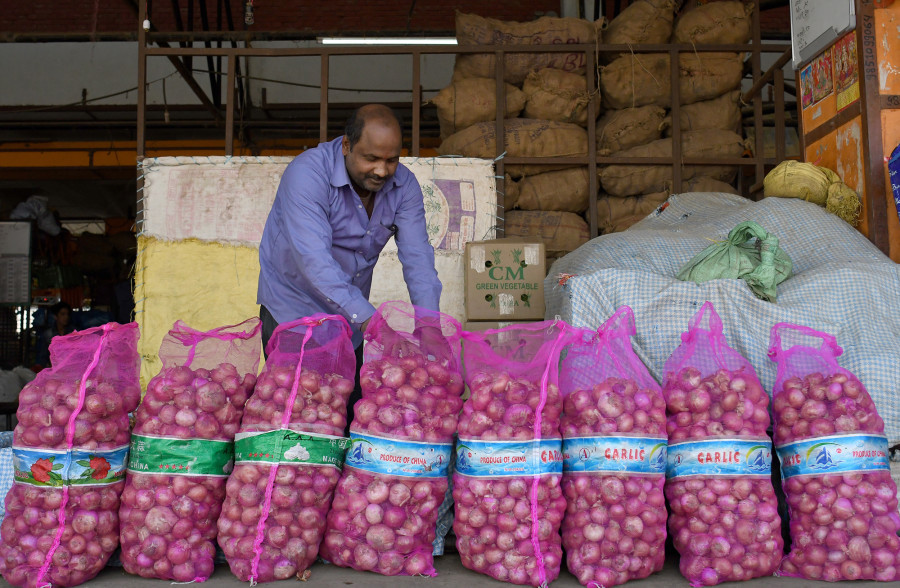Money
Vegetable prices rise sharply in the Valley as Tarai floods slash supply
Traders say prices would likely remain on the high side until the next harvest due in about three months.
Krishana Prasain
Vegetable prices increased sharply in the Kathmandu Valley on reduced deliveries as furious floods following nonstop rain ravaged key producing areas, damaging crops and disrupting transportation.
The jump in prices has dealt another blow to consumers already having a hard time managing household finances due to lost earnings from the Covid-19 lockdown.
According to traders, vegetable prices have swelled by 25-110 percent. The wholesale price of tomato, potato, onion, cabbage local, cauliflower local, eggplant, cowpea long, French bean long and hybrid, soybean green, pointed gourd local, snake gourd, smooth gourd, sponge gourd and okra has soared by up to 105 percent over the week.
Traders said prices would likely remain on the high side until the next harvest due in about three months. The southern Tarai plains are currently covered with paddy fields. Most vegetable items cost more than Rs100 per kg, sellers said.
According to the Kalimati Fruits and Vegetable Market Development Board, the price of potato (red) rose to Rs69 per kg on Thursday, up 35 percent compared to last week. Potato from Mude, Sindhupalchok has become dearer by 34 percent and now costs Rs59 per kg.
During this time of the year when supply is low, the country’s potato requirement is fulfilled by Indian imports, and shipments from the southern neighbour have also dropped this week.
Resham Tamang, administrator at the Balkhu Agriculture Vegetable Market, said that the retail price of most vegetables had crossed Rs100 in the valley due to short supply.
According to him, the Balkhu market has been receiving around 350 tonnes of vegetables daily as against 600 tonnes at other times.
Binaya Shrestha, deputy director at the Kalimati Fruits and Vegetable Market Development Board, said they were receiving 300 tonnes of vegetables in recent days compared to more than 600 tonnes before the rains began.
Normally, vegetable prices remain high until the Dashain festival in October as it is the paddy growing season. The monsoon also ends by the third week of September, said Shrestha.
The potatoes being sold in the market were left over from the last harvest, and there have been no imports from India in recent days, said Shrestha.
India has announced restrictions on the export of key food items as the Covid-19 pandemic may put pressure on supply as it has a large population to feed.
According to traders, the wholesale price of local cabbage jumped 111 percent within a week to Rs38 per kg. The price of cauliflower local has reached Rs115 per kg.
Similarly, the price of tomato small has increased by 50 percent to Rs18 per kg. The wholesale price of eggplant has gone up by 29 percent to Rs62 per kg. The price of cowpea has reached Rs65 per kg, up 96 percent. The price of French beans has increased 105 percent to Rs78 per kg.
Pointed gourd local costs Rs98 per kg, up 78 percent from last week. The price of snake gourd has increased 26 percent to Rs48 per kg.
While the price of smooth gourd has gone up by 37 percent to Rs48 per kg, sponge gourd went up 77 percent to Rs85 per kg. The price of okra has increased by 63 percent to Rs62 per kg.
The Kathmandu Valley gets most of its vegetables from Kabhre, Sarlahi, Bara, Chitwan, Dhading and Makwanpur districts.
According to a preliminary report issued by the Ministry of Agriculture and Livestock Development, incessant rain in the last few days inundated 88,677 hectares of land across the country.
Provinces 1 and 2, Bagmati Province and Gandaki Province may receive more heavy rain in the coming days, resulting in floods and landslides, weathermen said.




 16.88°C Kathmandu
16.88°C Kathmandu













